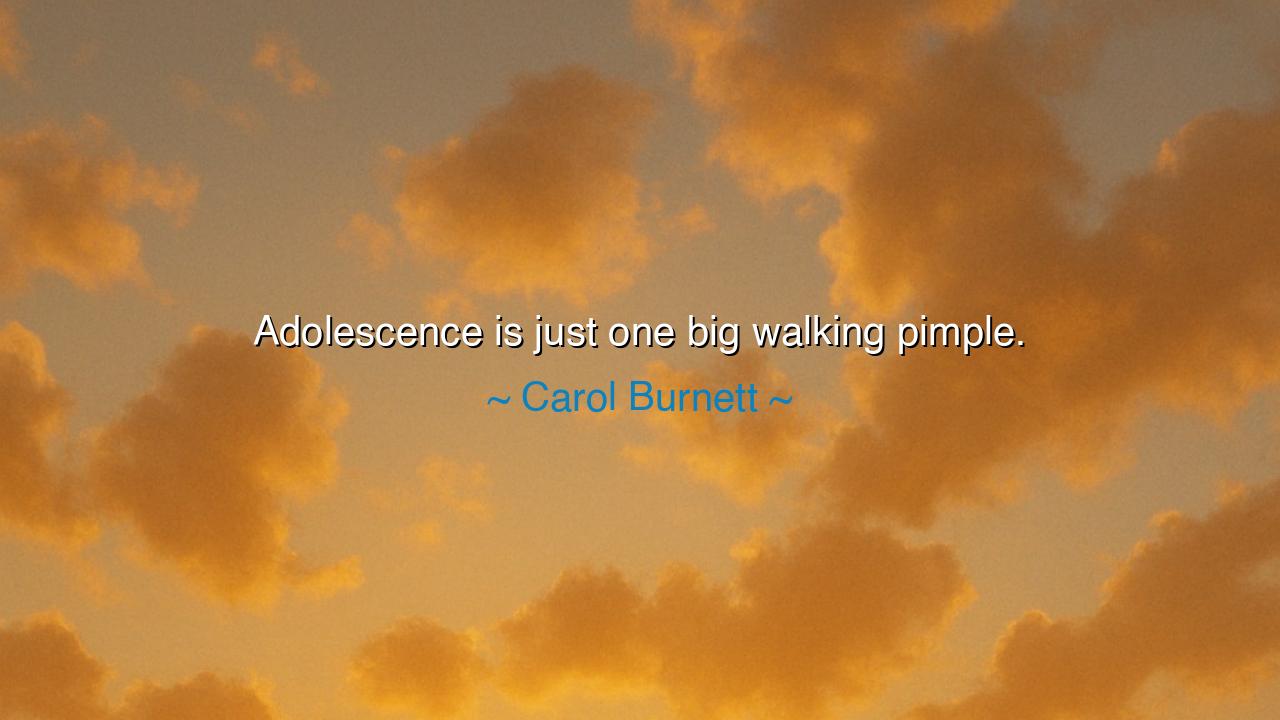
Adolescence is just one big walking pimple.






Carol Burnett, with her gift for humor sharpened by truth, once declared: “Adolescence is just one big walking pimple.” These words, though light in tone, hide beneath them a profound observation of the trials of youth. For adolescence, though often remembered through laughter, is a time when the body rebels, the skin betrays, and the spirit wrestles with self-image and insecurity. Her words are not cruelty, but compassion cloaked in jest, for she names aloud what so many silently endure — that adolescence is awkward, messy, and filled with discomfort, both physical and emotional.
The origin of such a remark lies in Burnett’s mastery of comedy, which always pointed to life’s shared experiences. As a woman who grew up in hardship and became a legendary performer, she knew that laughter could soothe pain, and that exaggeration could reveal hidden truths. In speaking of the adolescent as a “walking pimple,” she reduced an overwhelming storm of change into a single, humorous image. Yet behind the laughter is a truth: the young often see themselves not as radiant souls in bloom, but as blemished beings struggling to belong.
Consider the tale of Abraham Lincoln in his youth. History remembers him as a towering figure of dignity and resolve, yet in adolescence, he was awkward, gangly, mocked for his appearance, and unsure of his place in the world. Though no “sparkly dresses” or “proms” marked his passage into adulthood, his awkwardness was its own crucible. Just as the pimple upon the skin fades, so too did Lincoln’s youthful insecurities, leaving behind a man tempered by humility and empathy. Burnett’s humor finds resonance here: what feels overwhelming in youth is but a passing trial on the road to greatness.
The pimple, then, becomes a symbol of imperfection, of the temporary storms that accompany growth. Adolescence is not about perfection of form, but about the struggle that shapes the spirit. It is the time when one learns that the body changes beyond control, that the mirror may not always be a friend, and that self-worth cannot be measured by surface beauty. Burnett, with wit, points out what the wise already know — that the stains of youth are the seeds of maturity.
To the youth, these words speak as comfort: do not despair over the blemishes that mark your skin or the awkwardness that haunts your days. They are not signs of failure, but signs of becoming. Even the strongest oak was once a sapling that bent and cracked in the wind. Your struggles are temporary, and in their place will rise strength, resilience, and wisdom.
To parents and elders, this saying is a reminder of compassion. When the young complain of their appearances or obsess over their flaws, remember that such trials feel immense to them, even if fleeting in truth. Guide them not with dismissal but with patience, helping them see that what troubles them now will fade, and that their worth is far deeper than the skin.
The lesson endures: life’s seasons of awkwardness are never the final form. Just as adolescence gives way to adulthood, and pimples fade into memory, so too will our present discomforts dissolve when we endure them with humor, patience, and courage. Carol Burnett teaches us that to laugh at our struggles is to rob them of their power, and to see them as stepping stones rather than stumbling blocks.
Thus, let all who hear her words remember: every blemish is but a mark of transition, every awkward season a preparation for strength. Do not hide from them, nor magnify them, but embrace them as signs that you are growing, changing, and being shaped for the journey ahead. And when the pain feels too heavy, let laughter, as Burnett showed, be the balm that turns sorrow into light.






AAdministratorAdministrator
Welcome, honored guests. Please leave a comment, we will respond soon